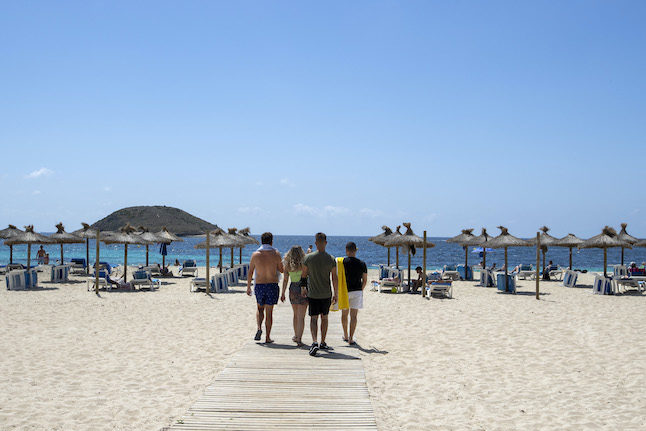Getting a visa to temporarily live and work in Spain can be a tricky process if you’re a non-EU national, with everything from proof of high levels of income to medical insurance or specific job skills being required. For young third-country nationals, it’s often not possible to meet such requirements.
However, there are some young foreigners who can come to Spain for one year, travel around the country, learn Spanish and take on a part-time job thanks to reciprocal agreements that exist.
Enter Spain’s working holiday visa, also called the Youth Mobility visa, a scheme that allows young people from Australia, New Zealand, Canada, Japan and South Korea to live and work in Spain for a one-year period.
READ ALSO: Worker, retiree or investor: What type of Spanish visa do I need?
What are the visa rules?
Keep in mind that your primary goal when applying for this visa should be to travel and live in Spain. Working should be a secondary motive to be able to earn money for your travels.
You will only be able to have a job for a total of six months during your one-year stay in Spain. You can also only work for one employer for a maximum of three months. This means that you will have to find a minimum of two different jobs during your stay.
The visa also allows you to visit other EU countries during your stay in Spain if you wish to travel within the bloc too.
Alternatively, you are also permitted to study or do an internship.
Note that the scheme is only for individuals. You cannot bring children along with you, partners or spouses will have to apply for their visas separately.
Who can apply?
Unfortunately, not everyone can apply for the working holiday visa for Spain. The Spanish government only has agreements with Australia, New Zealand, Canada, Japan and South Korea, meaning this visa is only available to those from these five specific countries.
These agreements are reciprocal, meaning that young Spaniards can also get a working holiday visa to live in any one of the above countries for a specific amount of time.
Unfortunately, for those in Spain who want to have a gap year abroad, these reciprocal schemes are only available to Spanish citizens, not foreign residents in Spain.
Keep in mind though, your country (the country of which you are a national) may already have a working holiday visa agreement with one of these five countries.
For example, the UK has agreements with Australia, Canada, New Zealand, South Korea and Japan, so you may be able to apply on the basis that you’re a UK citizen.
Other than your nationality, one of the main prerequisites for the working holiday visa to Spain is age. You are only eligible to apply if you’re between the ages of 18 and 30 (or 35 for Canadians).
Keep in mind that only a certain number of these visas are available each year. For example, from 2023, there will be a total 2,000 available to those from New Zealand, while there are 3,400 available to those from Australia. Once this number has been reached, Spanish consulates will not grant anymore for that year and you must wait until the following year to apply again.
READ ALSO: Spain and New Zealand to increase number of working holiday visas
Visa pre-requisites
There are certain documents you must produce and certain criteria that you must meet in order for your visa to be approved. These include:
- Having a return or onward ticket out of Spain
- Having the necessary funds to support yourself during at least the first three months of your stay. (The amount required may be slightly different depending on which country you’re from. Canadians for example need to show they have savings of at least €1,857 or CAD 2,504.75).
- Medical insurance
- A police check or clear criminal record
- A certificate showing you have completed at least two years of higher education
- A basic level of Spanish (Be aware that this is not a requirement for those from all five countries, but it is a requirement for those from Australia and Japan. There is no mention of this requirement for those from Canada or New Zealand).
- Some consulates may also require you to have proof of accommodation for at least the first week of your stay. This rule doesn’t apply across the board, but certain consulates such as the Spanish Consulate in Toronto, Canada will ask for it.
What types of jobs can I get?
You are eligible to apply for casual and temporary jobs. You should be aware that unemployment levels are very high in Spain (currently at 13.65 percent), so it will be difficult to compete against locals for jobs, who will always be given priority.
The key is to rely on your native language skills to find jobs that locals may not be able to do such as:
- language teacher
- waiter in a tourist restaurant
- tour guide
- receptionist in a hotel or resort
- bar staff in nightclubs for tourists
- nanny for families who want their kids to learn other languages
How to apply?
You can apply for Spain’s working holiday visa through your local Spanish consulate. Some consulates will allow you to apply online, while others require you to make an appointment and go in person.
You should be given a checklist from the consulate of all the specific documents they need from you, but the list above gives you a good idea of what you’ll need to show.
You will also need to pay the application fee. The amount varies depending on which country you’re applying from. For example, the fee for those from Canada is CAD 150.
Make sure to check online or phone ahead to find out when the applications open for the year you want to apply, so that you don’t miss out.
Once your application has been granted and you have arrived in Spain, you will need to apply for a Número de Identidad de Extranjero or NIE within the first month, in order to be able to work.
You can apply for this by making an appointment at your local police station or Foreigner’s Office (Oficina de Extranjeros), filling out the necessary forms and presenting your visa. You may also need to show your other documents again such as private medical insurance.



 Please whitelist us to continue reading.
Please whitelist us to continue reading.
Member comments